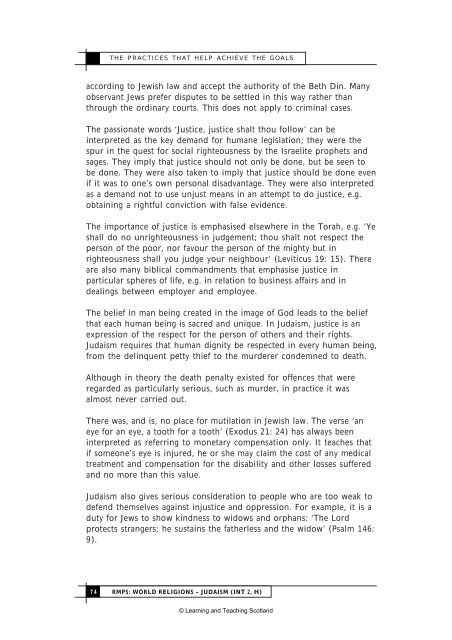RMPS - Int2/Higher - World Religions - Judaism - Education Scotland
RMPS - Int2/Higher - World Religions - Judaism - Education Scotland
RMPS - Int2/Higher - World Religions - Judaism - Education Scotland
Create successful ePaper yourself
Turn your PDF publications into a flip-book with our unique Google optimized e-Paper software.
THE PRACTICES THAT HELP ACHIEVE THE GOALS<br />
according to Jewish law and accept the authority of the Beth Din. Many<br />
observant Jews prefer disputes to be settled in this way rather than<br />
through the ordinary courts. This does not apply to criminal cases.<br />
The passionate words ‘Justice, justice shalt thou follow’ can be<br />
interpreted as the key demand for humane legislation; they were the<br />
spur in the quest for social righteousness by the Israelite prophets and<br />
sages. They imply that justice should not only be done, but be seen to<br />
be done. They were also taken to imply that justice should be done even<br />
if it was to one’s own personal disadvantage. They were also interpreted<br />
as a demand not to use unjust means in an attempt to do justice, e.g.<br />
obtaining a rightful conviction with false evidence.<br />
The importance of justice is emphasised elsewhere in the Torah, e.g. ‘Ye<br />
shall do no unrighteousness in judgement; thou shalt not respect the<br />
person of the poor, nor favour the person of the mighty but in<br />
righteousness shall you judge your neighbour’ (Leviticus 19: 15). There<br />
are also many biblical commandments that emphasise justice in<br />
particular spheres of life, e.g. in relation to business affairs and in<br />
dealings between employer and employee.<br />
The belief in man being created in the image of God leads to the belief<br />
that each human being is sacred and unique. In <strong>Judaism</strong>, justice is an<br />
expression of the respect for the person of others and their rights.<br />
<strong>Judaism</strong> requires that human dignity be respected in every human being,<br />
from the delinquent petty thief to the murderer condemned to death.<br />
Although in theory the death penalty existed for offences that were<br />
regarded as particularly serious, such as murder, in practice it was<br />
almost never carried out.<br />
There was, and is, no place for mutilation in Jewish law. The verse ‘an<br />
eye for an eye, a tooth for a tooth’ (Exodus 21: 24) has always been<br />
interpreted as referring to monetary compensation only. It teaches that<br />
if someone’s eye is injured, he or she may claim the cost of any medical<br />
treatment and compensation for the disability and other losses suffered<br />
and no more than this value.<br />
<strong>Judaism</strong> also gives serious consideration to people who are too weak to<br />
defend themselves against injustice and oppression. For example, it is a<br />
duty for Jews to show kindness to widows and orphans: ‘The Lord<br />
protects strangers; he sustains the fatherless and the widow’ (Psalm 146:<br />
9).<br />
74<br />
<strong>RMPS</strong>: WORLD RELIGIONS – JUDAISM (INT 2, H)<br />
© Learning and Teaching <strong>Scotland</strong>
















